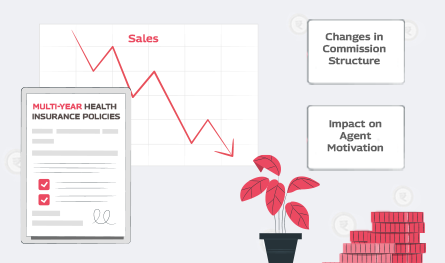
Taxpayers should know more about Section 139(1) of the Income tax act since it is the section under which they have to file their returns if they have missed filing within the due date.


The Indian health insurance sector is undergoing a major transformation due to the declining multi-year health insurance policy sales rate. The Insurance Regulatory and Development Authority of India (IRDAI) established new accounting norms, revamping the commission structure of insurance agents. This alteration in accounting standard is the primary reason behind the decline in multi-year health insurance policy sales.

The new standards in commission structures have reduced agent interest in promoting long-term health policies, thus driving them toward short-term policies. The policyholder marketplace will likely experience less promotion of multi-year plans, even though these plans provide valuable benefits. The assessment of health insurance developments requires a thorough analysis of the reasons behind policy sale decline and their consequent impact on policyholders, insurers, and insurance agents.
Policyholders have traditionally opted for multi-year health insurance as these policies provide several desirable benefits.
These advantages have not prevented the market from experiencing decreased sales of multi-year policies.
The revised commission guidelines from IRDAI influenced multi-year health insurance sales to decrease as the compensation process of insurance agents altered.
Before the new regulations, agents received full commission payment [in lump sum] during the sale of a policy. Agents received better financial rewards when they promoted policies with extended terms. According to the updated rules, commission payments are distributed across the entire policy duration [installment compensation]. Thus, according to the new policy structure, insurance agents will receive instalment payments.
Insurance agents function as critical influencers who shape the customer decisions. The new commission structure has cut down their short-term earnings. Therefore, agents primarily focus on annual policy sales, which provides complete commission payments during each yearly renewal.
Presently, the agents focus on single-year plans, which leads to reduced promotion of multi-year insurance policies. Health insurance policyholders have limited access to all available options when searching for coverage.
People who use short-term policies do not face problems from this change in policy promotion. However, the long-term financial effects will show a substantial impact. The premium costs for annual policies increase yearly, but multi-year policies maintain consistent pricing structures.
Most people need insurance agents to help them select their insurance coverage. Customers may fail to learn about the fundamentals of multi-year policies as agents refrain from recommending them. Therefore, customers remain unaware about these plans and their advantages.
Insurance providers are in search of adequate methods to adjust their operations according to this evolving market. Some strategies being considered include:
Insurers must find an equilibrium between rewarding agents and selling policies that benefit customers to maintain multi-year policies as a substantial market option.

Paybima Team
Paybima is an Indian insurance aggregator on a mission to make insurance simple for people. Paybima is the Digital arm of the already established and trusted Mahindra Insurance Brokers Ltd., a reputed name in the insurance broking industry with 17 years of experience. Paybima promises you the easy-to-access online platform to buy insurance policies, and also extend their unrelented assistance with all your policy related queries and services.

Taxpayers should know more about Section 139(1) of the Income tax act since it is the section under which they have to file their returns if they have missed filing within the due date.


Have you ever caught yourself lost in illusions about your daughter's future events, such as her university convocation and first day at work? Her university convocation. When she embarks upon her initial job after graduation will be the day.

In a country where medical inflation is rising rapidly, securing a comprehensive health coverage plan for the entire family is no longer optional, it is essential. Selecting the right health insurance requires careful evaluation of multiple factors, not just premium costs. A well-chosen plan ensures financial security, access to quality healthcare, and peace of mind during medical emergencies.


Term insurance is an important investment. However, with the availability of so many insurers offering term plans, it becomes difficult to select the best term plan to suit your needs. Buying a term plan needs some consideration and research on the part of the policyholder. In this post, let us discuss the best term insurance providers in India.

.png)
When you sign up for a life insurance policy - whether it’s a traditional term insurance policy or a ULIP – you are not just buying peace of mind. You are also trusting the insurer with your money. So naturally, you would want to know: How is that money being managed? And more importantly, how is it being protected from risky decisions?
